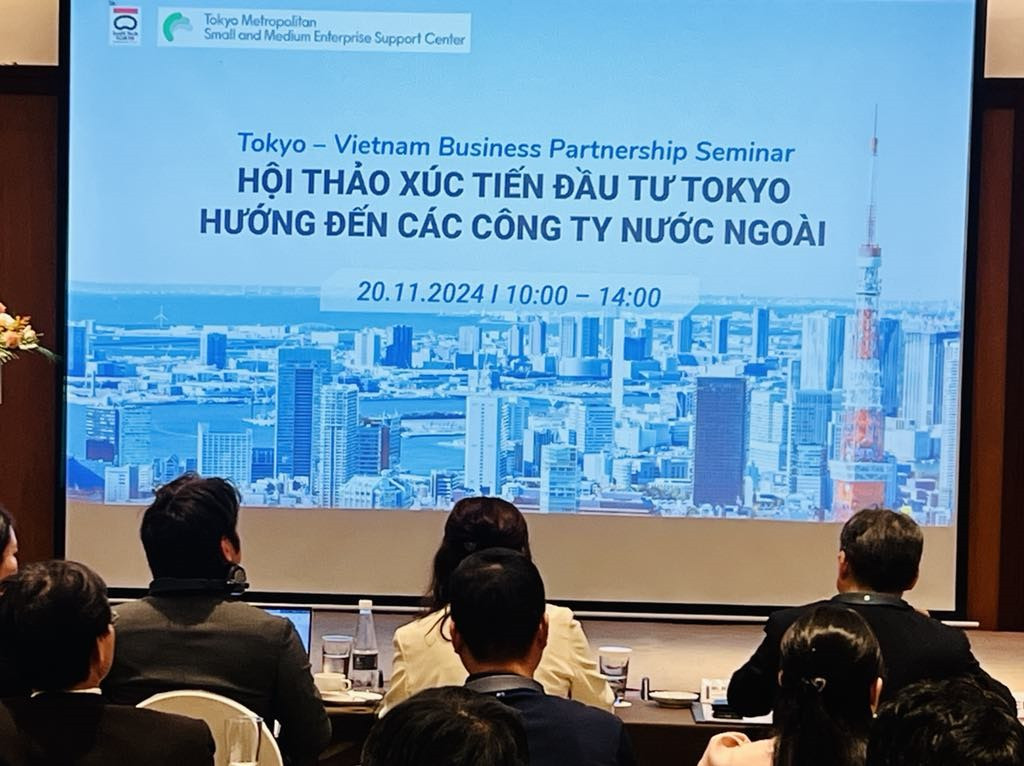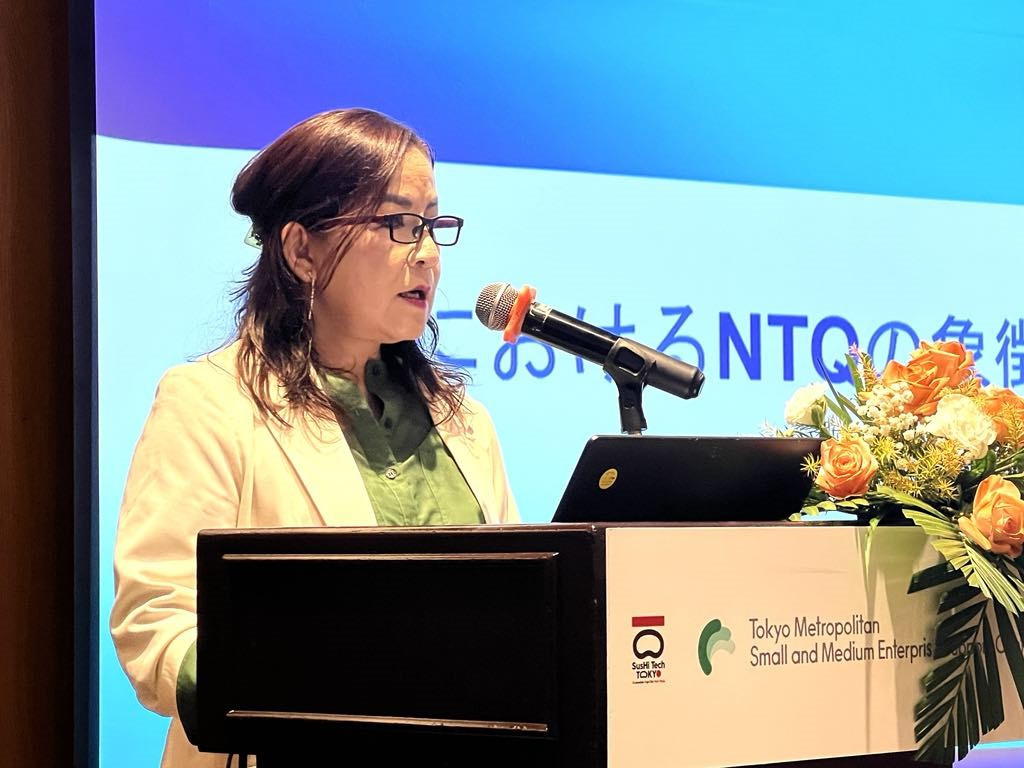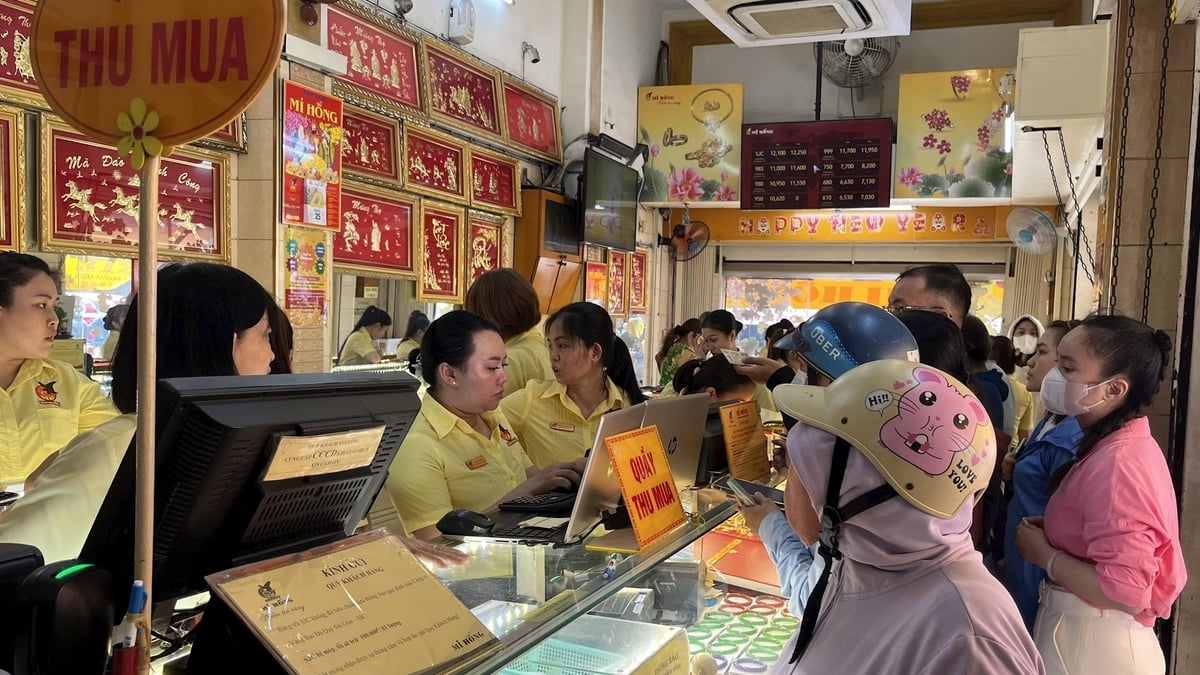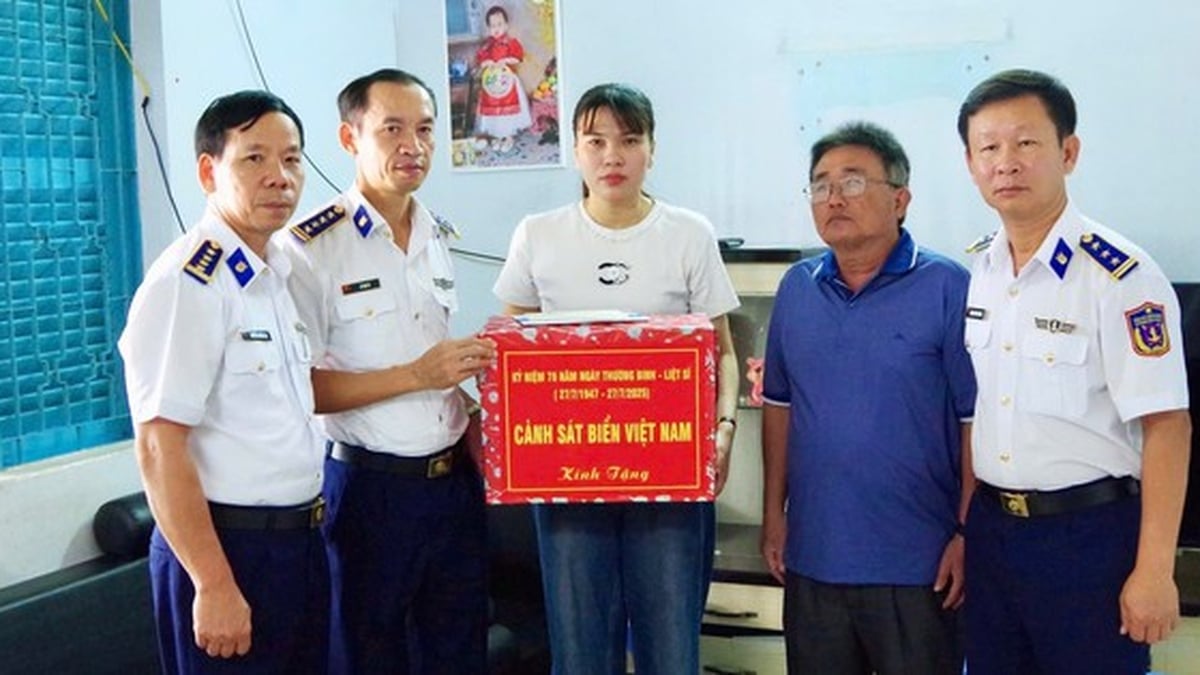With the Green Transition Grant for Tokyo Market Entry (including Industry 4.0), newly established businesses receive up to 50 million yen for the first year, in addition to many other financial supports.
Advantages of Tokyo A series of attractive information inviting Vietnamese enterprises to open companies and establish business operations was shared at the "Tokyo Investment Promotion" Seminar, organized by the Tokyo Small and Medium Enterprise Support Center (Japan) in Hanoi on November 20. Mr. Yuji Ikeda, Deloitte Tohmatsu Venture Support Company, said that Tokyo is the city with the 4th highest GDP in the world (about 600 trillion yen), tops the global urban population rankings and third in the global cities rankings, and is considered one of the largest economic cities in the world. Of the 41 Japanese companies on the FORTUNE Global 500 list, 29 are headquartered in Tokyo. 76% of foreign companies are headquartered in Tokyo, proving that this city is Japan's investment center for foreign companies. Of these, European companies account for the largest number (42.6%), with Southeast Asian companies still quite few. Tokyo ranked 10th in the Global Startup Ecosystem Ranking. In 2022, the Japanese government announced a five-year startup development plan, with an investment package of about 10 trillion yen aimed at creating 100 “unicorn” companies and 100,000 startups. 


The workshop was recently held in Hanoi by the Tokyo Small and Medium Enterprise Support Center (Japan) to invite Vietnamese enterprises to "advance to Japan". Photo: Binh Minh
A series of large foreign companies, notably semiconductor and AI (artificial intelligence) companies, are opening factories and facilities in Japan. Typically, OpenAI, an American AI research company, has opened an office in Tokyo, the fourth in the world and the first in Asia. According to a survey of foreign companies, the most attractive points of Tokyo include: High income and a large number of customers for products/services - large market size; Fully developed infrastructure (transportation, energy, information and communication...); Customers are sensitive to the added value of products/services; Concentration of many global corporations and companies; Good living environment. “Compared to major countries and cities in the world , Japan and Tokyo are generally highly regarded for their infrastructure, including transportation and digital, which provide the foundation for life and business. In the Global Ranking of World Cities (2023), in the field of Transportation and Accessibility, Tokyo ranked 8th out of 48 surveyed cities. Although Japan ranked 87th out of 133 countries in the EF English Proficiency Index, English proficiency in Tokyo is at an average level thanks to the well-developed English environment in urban areas,” Mr. Yuji Ikeda added. Many supports to overcome financial barriers A recent survey by the Japanese Ministry of Economy, Trade and Industry on factors hindering business expansion in Japan showed that high business costs (labor costs, taxes, business office rental, etc.) are the biggest barrier. 75.1% of surveyed businesses expressed concerns about this issue. However, Ms. Marisa Yamamoto, representative of Deloitte Tohmatsu Venture Support, emphasized: "The Tokyo Metropolitan Government and many other agencies are implementing channels to support businesses that want to enter this market, including financial support for newly established businesses." She listed a series of specific programs with support amounts of up to tens of millions of yen. With the Green Transformation Subsidy program for entering the Tokyo market for sustainable businesses, including Industry 4.0, a maximum subsidy of 50 million yen will be provided for the first year and continued support for up to 4 years, provided that the facility is established before March 2025. The green transformation technology category includes: Energy-related industries (wind, solar, geothermal energy, hydrogen and ammonia, next-generation thermal energy); Transportation and manufacturing industry (semiconductor, shipping, electricity/hydrogen; vehicles/batteries/fuel cells); Home and office related industry (home, building, next-generation electric energy management, sustainable lifestyle related); Digital and Carbon measurement related industry. With the Temporary Office Allocation Program for Foreign Financial Companies, businesses are supported with temporary residence permits, office rental costs up to 0.3 million yen x 3 months or 0.15 million yen x 6 months, and initial costs up to 0.2 million yen to conduct preliminary research for investment in the Tokyo market. In addition, the Foreign Financial Company Establishment Support Program is willing to pay half of the actual costs (up to 7.5 million yen) for initial office costs, personnel recruitment costs, costs arising from consulting with experts... when establishing a new business in Tokyo. Or the Facility Support Program for newly established foreign financial companies in Tokyo will pay half of the actual costs (up to 10 million yen) for office rental costs, equipment and supplies costs, consulting costs for experts... to partially support the necessary costs for promoting business development. In addition, Vietnamese businesses wishing to establish business in Tokyo can also access many other practical programs and activities. For example, the Tokyo Business Development Center is ready to provide information, support business connections and fundraising activities, even information about daily life such as hospitals, schools, etc. The Tokyo One-Stop Business Establishment Center (TOSBEC) supports business registration procedures, tax records, etc. for those who cannot speak Japanese. Or the Tokyo Innovation Base (TIB) has a co-working space, so that newly established companies can organize free events every day. Only about 35,000 USD in charter capital is required, but pay attention to cultural characteristics . After nearly 8 years of operating in the Japanese market, in April last year, NTQ Japan moved its office from Yokohama to Tokyo. Unlike many people's concerns about the expensive costs of establishing a business in Japan, Ms. Mizuno Gia Cat, representative of NTQ Japan, shared the reality: The conditions for a foreigner to enter Japan to establish a company with at least 2 initial members are quite easy. You only need about 5 million yen (30,000-35,000 USD) for charter capital. The initial tax is only about 5,000 USD. The cost of renting a small office of about 20-30m2 in the suburbs is also quite cheap.
Ms. Mizuno Gia Cat, representative of NTQ Japan, shares practical experience. Photo: Binh Minh
For operating staff, the average salary for a new graduate is from 2,000-2,500 USD/month. Startups can hire an accountant for 200-300 USD/month. "Many people consider that the initial investment cost is not high. Not to mention, if the business has a clear business plan and real capacity, it will also enjoy many other support policies. Just establishing a legal entity in Japan has the right to receive support from the government," she said. However, Ms. Cat also noted that in the context of very high competition from Chinese and Indian competitors... in the Japanese market, if businesses want members to stay and contribute long-term, they must have good treatment policies. Before deciding to establish a company in Japan, Vietnamese businesses should carefully research the market and cultural characteristics; go on short-term business trips to survey the market (possibly through exhibitions) to create a network in the future; Prepare key members who are good at Japanese... In particular, "it is necessary to build good relationships with the Vietnamese community in Japan (about 600,000 people) as well as with partners and local agencies where the office is located. Tokyo has 23 districts with policies specifically for businesses. If you have relationships and good language skills to learn about procedures, you will receive more support," Ms. Cat recommended. In addition, real estate costs in Tokyo are quite high, so it is necessary to prepare plans for activities related to employees' lives. For example, at NTQ Japan, there are many clubs (badminton, mountain climbing, soccer...), when the headquarters was in Yokohama, it was easy to rent an indoor court; but when moving to Tokyo, the narrow location was quite expensive. Mr. Yuji Ikeda also gave some notes for Vietnamese businesses when cooperating with Japanese companies. Notably, the culture of giving gifts or communicating at the banquet table is a unique cultural feature of Japan. Through soft communication, Japanese enterprises will evaluate whether their partners are trustworthy or not. “The decision-making process of Japanese organizations and enterprises has to go through many levels, so it takes time. Contracts, quotations... must follow a template, and the internal approval process is complicated. If you want to invest in Japan, try to communicate well to speed up the decision-making process,” Mr. Yuji advised./. Source: https://vietnamnet.vn/doanh-nghiep-viet-muon-nhat-tien-co-the-duoc-ho-tro-hang-chuc-trieu-yen-2343957.html
































































































Comment (0)